Cats do the weirdest things – that is why we love them! And what a cat thinks is a tasty treat is often no exception.
As a veterinarian for over 15 years, I have heard all about odd things cats like to eat.
Butter is pretty high on the everyday kitchen staples that tempt our furry feline friends.
So, can cats safely eat butter?
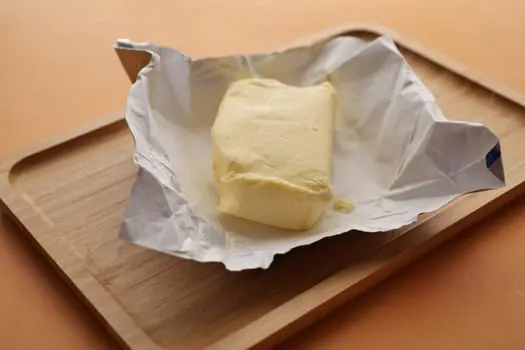 Cats can eat butter; however, they should not eat very much. Not many pet parents often choose butter as a treat for their cats.
Cats can eat butter; however, they should not eat very much. Not many pet parents often choose butter as a treat for their cats.
Most people wonder if it is safe for a cat to eat butter after they catch their sneaky kitty grabbing a bite off the counter.
Some people ask if butter can also be used as a treatment for hairballs.
Is Butter Toxic To Cats?
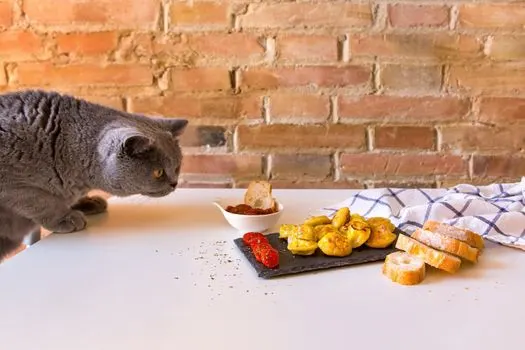 Butter is not toxic to cats, so if you have just come into the kitchen and found your feline friend snacking on your butter, be reassured that toxicity is not a problem.
Butter is not toxic to cats, so if you have just come into the kitchen and found your feline friend snacking on your butter, be reassured that toxicity is not a problem.
That being said, overeating butter can cause some gastrointestinal upset in a cat. You may see vomiting, stomach upset, nausea, or diarrhea, depending on how much butter your cat ate.
Butter is meant to be consumed by people, not cats. Though cats may find it appealing and not toxic, it is also not very good for them.
True Carnivores
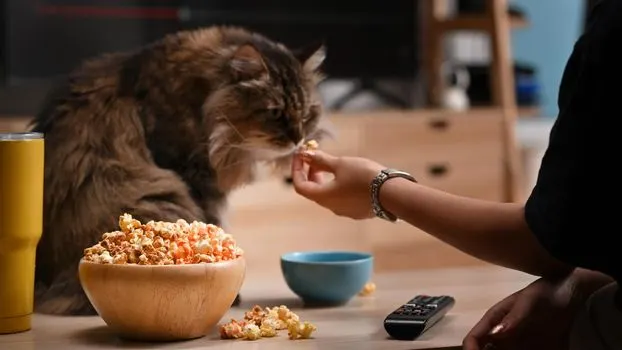 Cats are not tiny humans and have vastly different nutritional needs than we do.
Cats are not tiny humans and have vastly different nutritional needs than we do.
Cats are “true” or “obligate” carnivores. This means they should be getting more significant than 70% of the calories in their diet from meat.
This carnivore designation means that cats have an incredibly high protein requirement.
If a cat fills up on other foods not meant for them (i.e., butter, etc.), it may not consume enough of its cat food to fulfill its dietary requirements for protein.
Before cats were domesticated, they ate primarily other small animals as the mainstay of their diet. This included mice and birds.
This diet high in meat and moisture provided them with all of the protein and other nutrients that they needed.
Lactose Intolerance
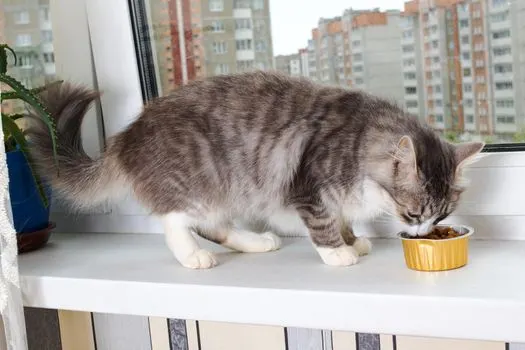 I am often asked, “Are cats lactose intolerant?” The answer is “Yes” most of the time.
I am often asked, “Are cats lactose intolerant?” The answer is “Yes” most of the time.
Once they reach adulthood, cats typically lack the enzyme needed to break down the sugar contained in milk, which is lactose.
Suppose a cat is given too much lactose, usually in the form of cow’s milk. In that case, it will experience gastrointestinal upset and distress in stomach pain, gas, bloating, vomiting, and diarrhea.
The issue is usually dose-dependent, meaning small quantities of milk, or lactose, are fine, but too much may make the cat ill.
Other dairy products, such as cheese, yogurt, and butter, have much less lactose and rarely cause an issue for cats unless they are susceptible or eat a large amount.
Not all cats are lactose intolerant, and some can handle eating large quantities of lactose-containing products.
However, this brings us back to the issue of preventing cats from eating their regular diet if they are too full of human food.
Why Do Cats Like Butter So Much?
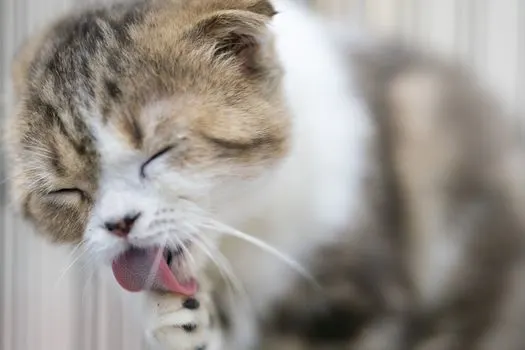 It is common to see cats portrayed in books or art peacefully lapping up milk from bowls. Though it is true that most cats like milk and will drink it if offered, as discussed, it is not the best food for them.
It is common to see cats portrayed in books or art peacefully lapping up milk from bowls. Though it is true that most cats like milk and will drink it if offered, as discussed, it is not the best food for them.
Cats like milk and butter because of their high-fat content. They are smooth and tasty, with no spices or bitter tastes that would turn off a cat and its delicate palate.
Unfortunately, like children, cats often do not know what is best for them regarding nutrition.
If left to their own devices and given a choice in their dietary menus, most cats would become unhealthy.
Butter To Treat Cat Hairballs
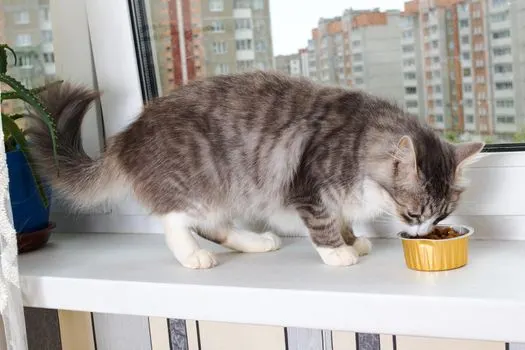 Now that we know butter is not toxic but also not a good dietary choice for our feline friends, what about the theory that giving some butter to a cat is an effective hairball treatment?
Now that we know butter is not toxic but also not a good dietary choice for our feline friends, what about the theory that giving some butter to a cat is an effective hairball treatment?
Hairballs can be a distressing issue for both you and your cat. It can be very scary if you are home and hear your cat trying to vomit up a hairball.
Typically, hair that your cat swallows will pass through the gastrointestinal tract and be expelled in their feces.
Hairballs occur when the hair builds up and gets trapped in the cat’s stomach. Because a cat cannot digest hair, if the hairball cannot pass out of the stomach into the intestines, the cat must vomit the hair back up.
Almost all cats get hairballs from time to time because they are self-groomers. Long-haired cats tend to have more issues than shorter-haired cats.
You can do a few things to help your cat if they are struggling with hairballs. Always speak to your veterinarian if you are concerned with your kitty’s health.
Brushing and Grooming
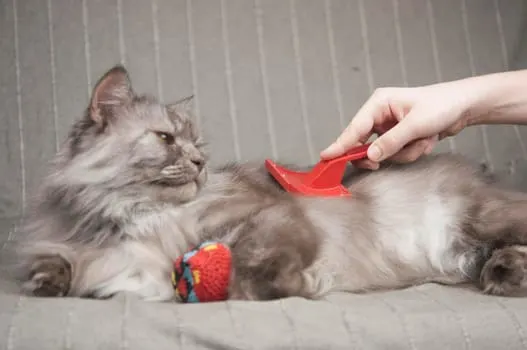 Always brush and groom your cat regularly to reduce the amount of loose hair they may ingest.
Always brush and groom your cat regularly to reduce the amount of loose hair they may ingest.
Regular brushing sessions will go a long way in keeping the hair off your cat’s body and, therefore, out of its stomach.
Your cat should still self-groom, but with less loose hair, you should see a dramatic reduction in hairballs, and regular brushing sessions are a great way to spend quality time with your pet!
Some cats also benefit from regular clippings where the cat is shaved completely.
Shampoos and Bathing
For the more adventurous cat owner, some shampoos and wipes can work to loosen and remove excess hair.
Some cats may oppose water and wetness, so these should be introduced slowly and carefully.
Hairball Control Foods
There are foods marketed to aid in hairball control. These foods use unique blends of fiber to assist in the cat’s digestion and to help any ingested hair pass through the intestinal system.
The formulas also contain ingredients meant to nourish the skin and hair to keep them healthy. These diets should always be paired with regular brushing.
Butter is not necessary, nor probably helpful, for the control of hairballs in cats.
If your cat has many hairballs that are not easily remedied with the methods mentioned above.
If it is losing weight or has any difficulty breathing or vomiting more than usual, it needs to be seen by a veterinarian immediately.
Related Questions
Can cats eat margarine?
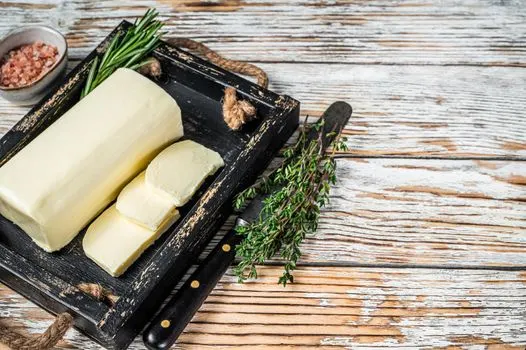 The answer to this question is much the same as the answer to butter; however, margarine is a different product than butter.
The answer to this question is much the same as the answer to butter; however, margarine is a different product than butter.
Margarine is made from vegetable oils instead of animal fats. This product is derived from plant-based oils, but does this mean margarine is suitable for cats? Again, no, but it is not toxic.
Plant oils are high in fats, though not as high as animal fats. Margarine is also low in protein, which cats need.
Eating margarine, just as eating butter, will likely fill up a cat and prevent them from consuming adequate amounts of the necessary cat food they need.
Margarine may also cause gastrointestinal upset, such as vomiting, stomach pain, gas, bloating, and diarrhea.
Can Cats Eat Cheese?
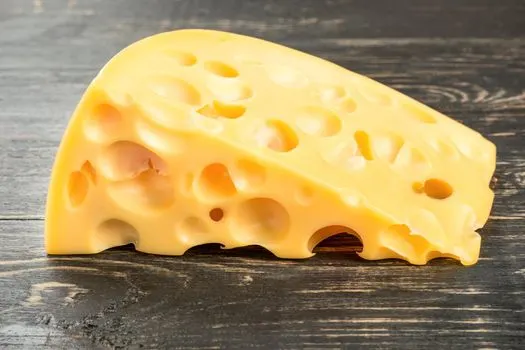 Cats can eat cheese as it is not toxic, but as the majority of cats are lactose intolerant, too much cheese may cause gastrointestinal upset.
Cats can eat cheese as it is not toxic, but as the majority of cats are lactose intolerant, too much cheese may cause gastrointestinal upset.
Most cats like cheese due to its taste and high-fat content. It can make an easy and convenient treat.
Small bites of cheese as an occasional treat are fine, but they should be limited to small nibbles and discontinued if any stomach upset is observed.
Can Cats Eat Olive Oil?
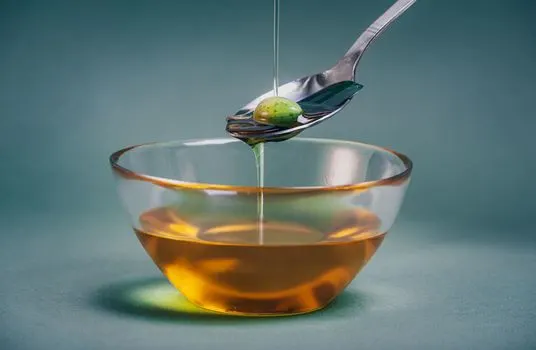 Cats can consume olive oil and foods cooked in olive oil. Olive oil is not toxic to cats.
Cats can consume olive oil and foods cooked in olive oil. Olive oil is not toxic to cats.
However, cats are not accustomed to diets high in vegetable oils, and a large amount of oil may lead to tummy trouble. Avoid allowing your cat to overeat olive oil or excessively oily foods.
If too much olive oil is eaten, cats may exhibit signs of gastrointestinal distress such as vomiting, stomach cramping, gas, bloating, and diarrhea. Ill cats should be taken to a veterinarian right away.
Olive oil should never be used as a treatment for hairballs. Not only is this not an effective treatment for hairballs but cats being fed liquid oil for hairballs may also inadvertently get the olive oil into their lungs. This is extremely dangerous.
Olive oil (or any oil or other liquid substance) in the lungs may lead to aspiration pneumonia and can be fatal.
Frequent brushing is the most effective tool to combat the issue if your cat is struggling with hairballs. If the condition is bothersome, please consult your cat’s veterinarian.
Dr. Jamie Whittenburg is a vet with 15 years of clinical experience. She graduated from Kansas State University College of Veterinary Medicine in 2006. Her area of expertise is small animal general practice, equine practice, surgery, and academia.
Dr. Whittenburg operates her own hospital in Lubbock, TX, named Kingsgate Animal Hospital. Medically, she’s most interested in practicing general surgery and feline medicine. When not at work, Dr. Whittenburg enjoys outdoor activities, reading, and spending time with her family.

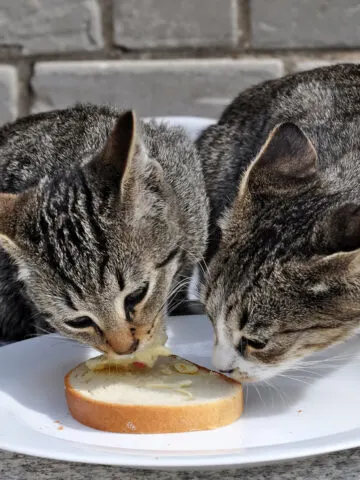

Leave a comment
You must be logged in to post a comment.